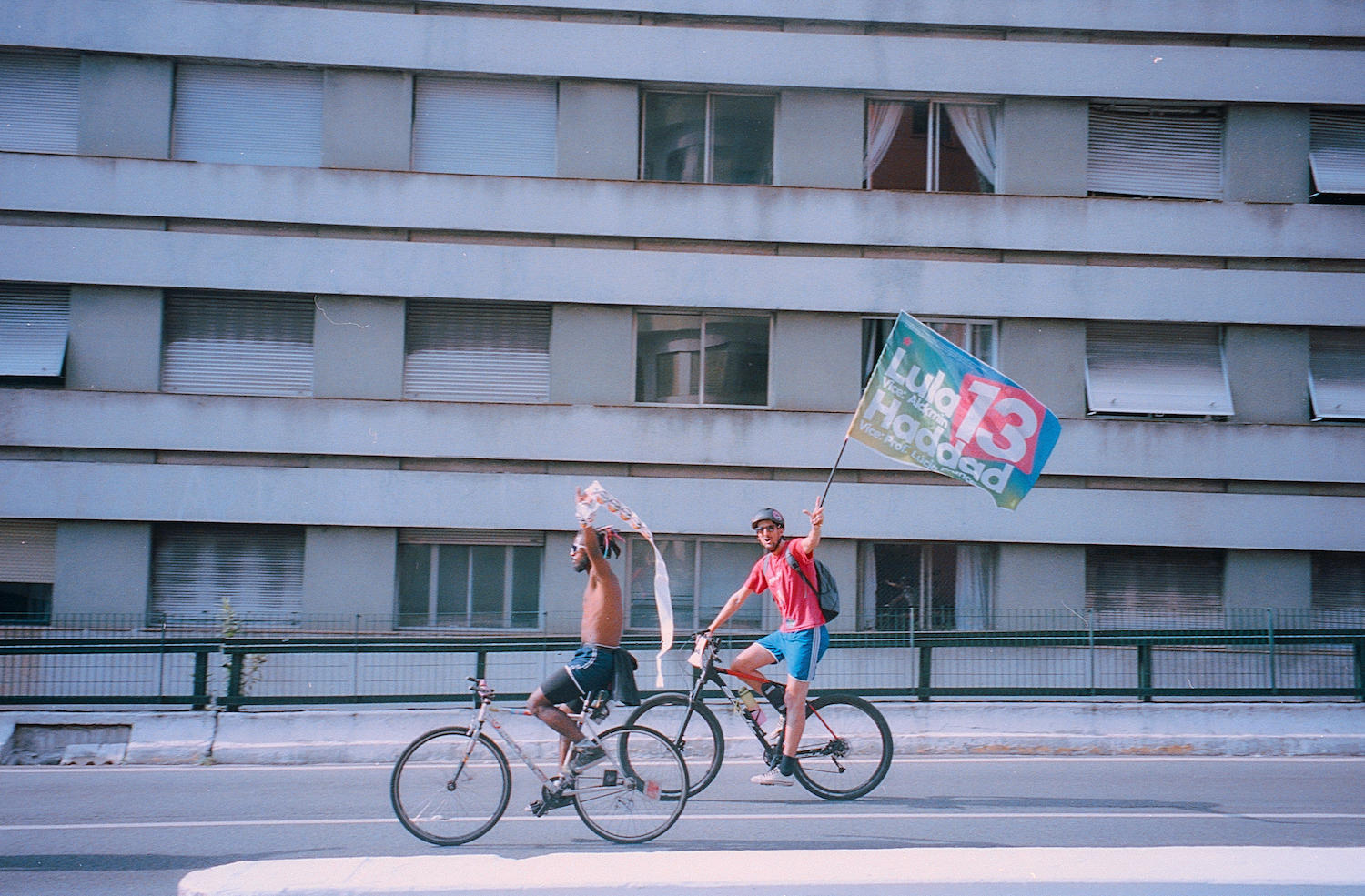Pedro Pinho is a São Paulo-based photographer. The weekend before the second-round vote of the Brazilian general election, which took place on 30 October, he travelled across the city photographing rallies held in support of Luiz Inácio Lula da Silva — AKA Lula — the leader of the left-wing Worker’s Party. Yesterday, he won the majority of the nation’s vote, toppling the dangerously right-wing government of Jair Messias Bolsonaro. Here, Pedro and the activists and rally attendees he interviewed discuss the significance of the election — not just for Brazil, but for the rest of the world, too.
Brazil today stands divided under the influence of a far-right government. During these rallies, I was reminded both of the Brazil I love and of the awful situation we’re in. At the moment, being Brazilian feels like constantly having something stuck in your throat — a constant discomfort that you can’t get over. Politically, these have been the worst for years since I’ve been alive, and we’ve been feeding off nostalgia for a while now. The whole country now understands the importance of thinking politically — I guess both sides think their lives depend on these elections, although I would argue that one side really has its life on the line and the other perhaps has its business and profit margins to lose.
In the conversations I had while attending the rallies, the most pressing issues we face were raised, with people’s opinions painting a grim picture of a crumbling nation. Naturally, reading them conjures feelings sadness, and makes me a little sentimental thinking about the past. However, I hope that when you read these, you’ll also see the pictures that I think convey the mood that’s palpably felt here. The mere possibility of change and the permission to dream of a brighter future again are uniting Brazilians everywhere. Booming Brazilian beats were the sonic backdrop to these pictures, a soundtrack that coloured all the anxiety with feelings of victory — even if perhaps to soon. People say hello to each other on their bikes and gesture the letter L, for Lula, with their fingers. Seeing signs like these, you can’t help but feel the tiniest bit of hope.
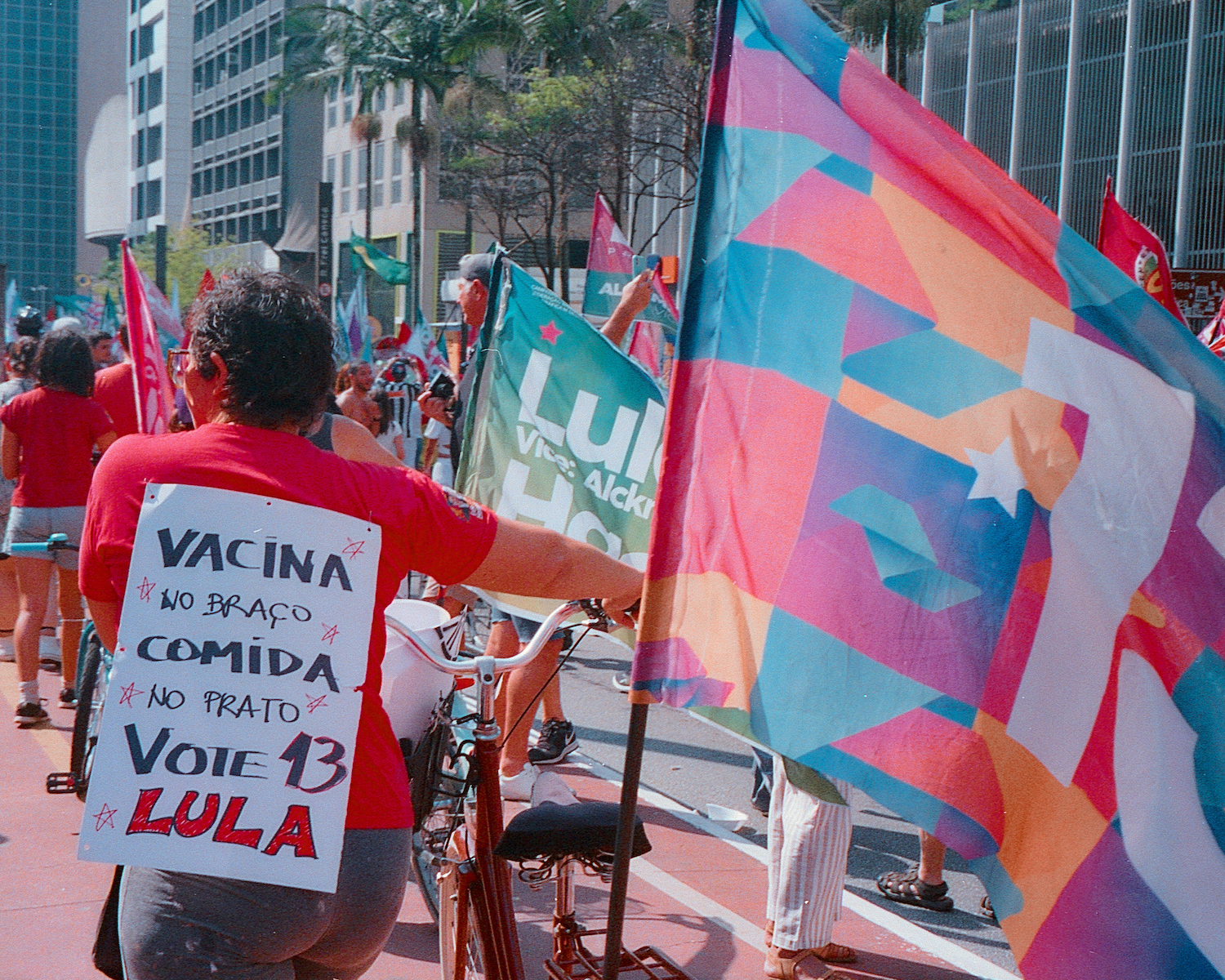
Isabel Piragibe, rally attendee
“I live on the east side of São Paulo, and I came here today with the international women’s march I’m part of. We’re desperately fighting for the unnameable [Jair Bolsonaro] not to be elected, and we’re trying to communicate with the masses so that we can bring more sympathy and consequently more votes to the left. I’m here for the lives of women, for everything that we conquered and lost and for the past that we have already fought for. I stand with Lula and Dilma [Rousseff, the former president of Brazil] for the return of public policies to combat violence against women.
Furthermore, Brazil is a country of continental proportions — it is not just empty land. We have yet to discover our true vocation, one that unites Brazilians to honour our Indigenous and Black ancestry — and their descendants who are still subjugated in our country. These groups are the real owners of Brazil. Mother nature is Indigenous and she belongs to all human beings.”
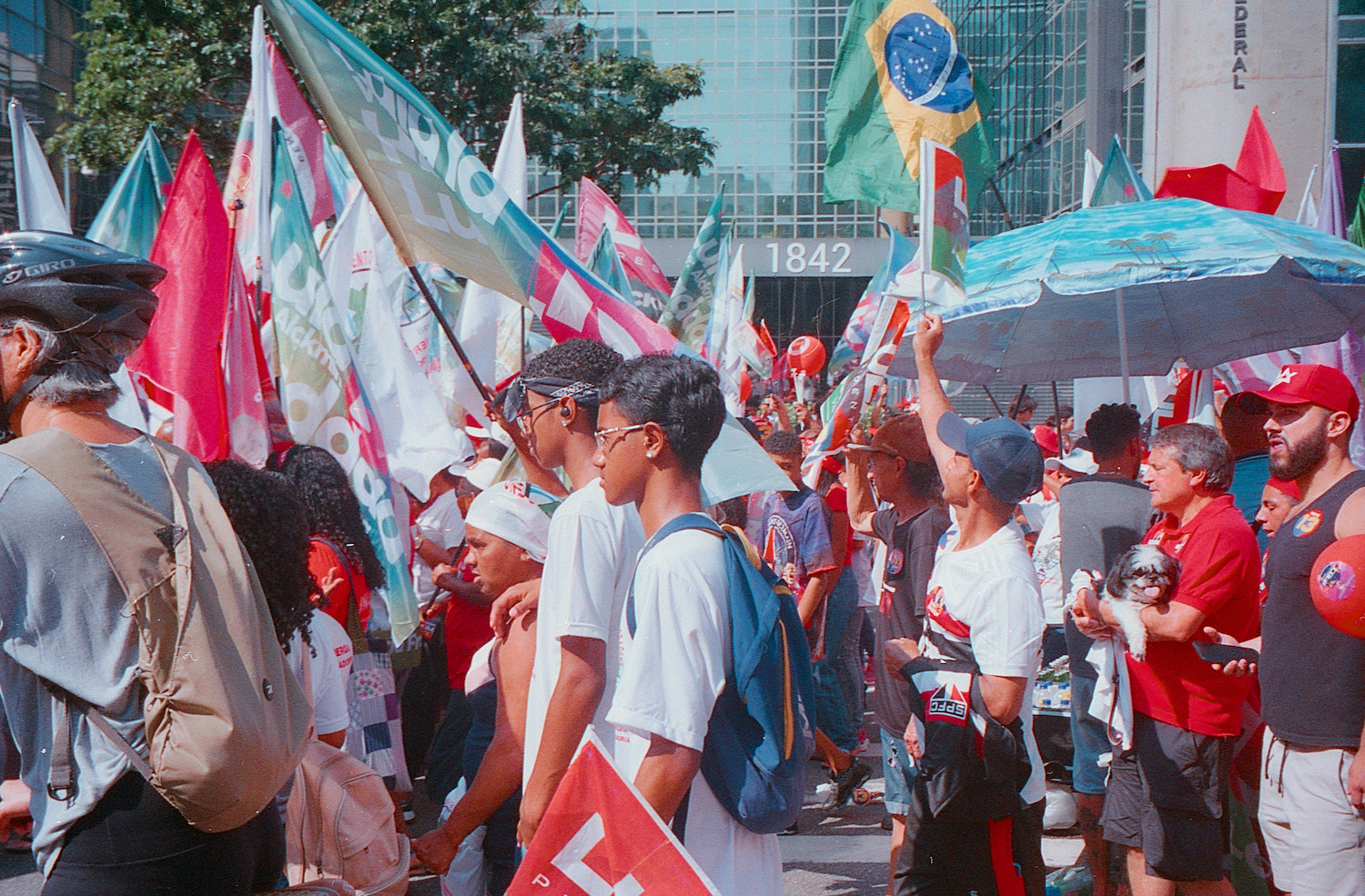
Edna Ferreira, rally attendee
“At 67 years old, I had never witnessed so many lies. People use the term ‘fake news’, but I call it for what it is: lies, slander, and defamation that the unspeakable — our president — spreads along with his gang. We currently have a fascist, a Nazi in government. I was 9 years old when the 1964 coup [the beginning of Brazil’s 21-year military dictatorship] happened, so I was a child, teenager and young woman during the coup. Finally, when I was 29 years old when we conquered the sort of false democracy that we’ve seen return with our current president.
I want the Brazil that Lula was trying to build: electrical energy for all, and running water throughout the Northeast [one of Brazil’s poorest regions]. A Brazil that cares for its homeless population, which has grown frighteningly. I want all this to end so we can breathe again. I want to resume the construction of our democracy; for undecided voters to wake up to life. We have no more time. It’s either democracy or barbarism.”
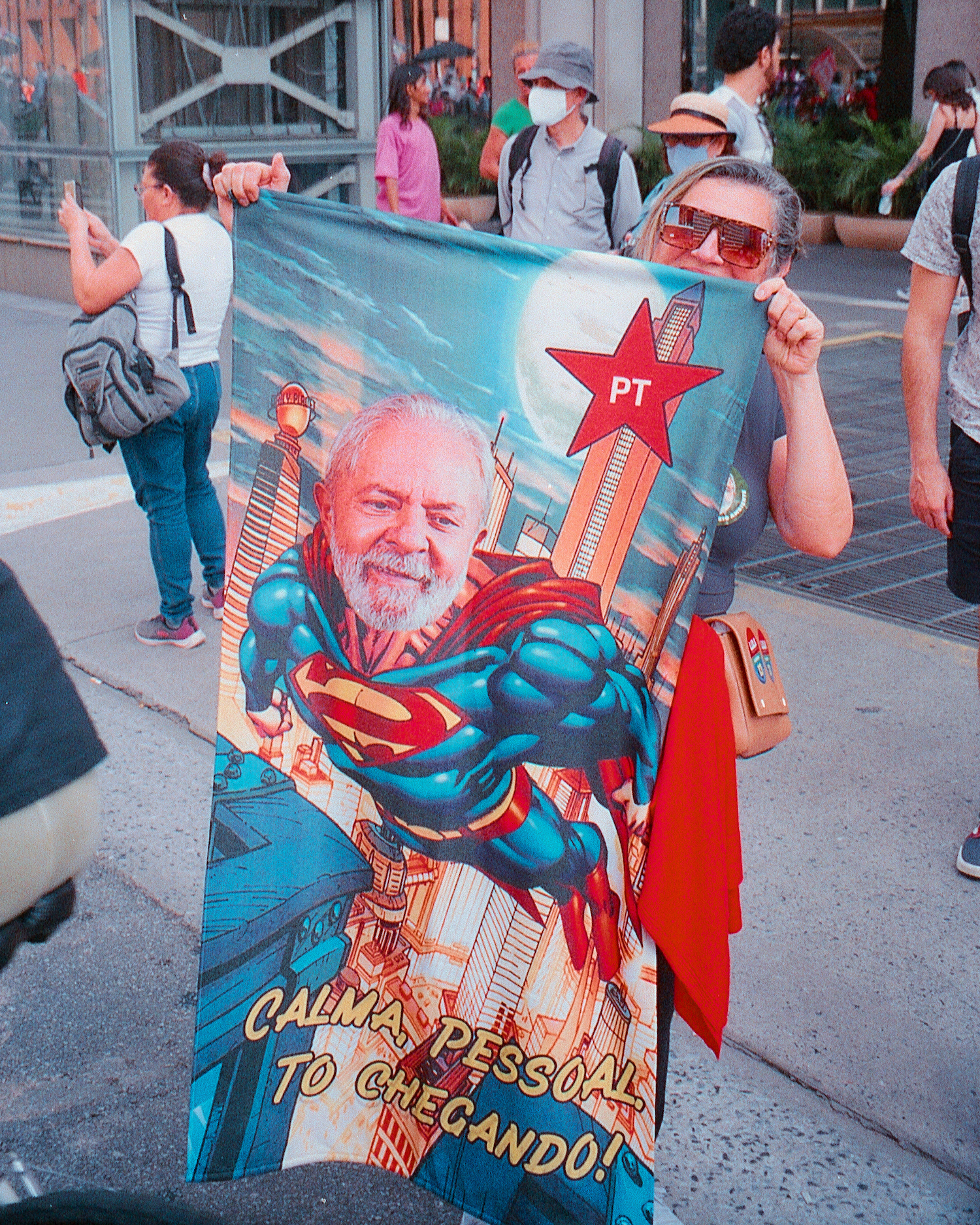
Larissa Mendes, social scientist and an assistant researcher at the Federal University of Rio de Janeiro
“Since 2018, we have noticed an abnormal polarisation in the Brazilian political environment. This polarisation is fuelled by hate speech and discourse against minorities. This is the first time since regaining our democracy that we’ve actually had to fight to defend it. What motivates me in these elections much more than other electoral disputes is the fundamental need to maintain our democracy, to reestablish respect for our institutions and for our way of doing politics. We have to point out that hate speech cannot be a part of political debate.
In 2018, an elected member of congress was brutally murdered for political reasons [Marielle Franco, a queer Brazilian politician, sociologist, feminist, and human rights activist whose murder remains unsolved to this day]. Since then, political violence has increased and is always directed at minority groups: trans congresswomen have been threatened with death, LGBTQIA+ figures have had to go into exile, and Black women have been consistent victims in this system. It is a very worrying portrait of Brazil.
Much has also been said about the Amazon being the lungs of the planet — a necessary place for the maintenance of global climate balance. The current government systematically violates rules and laws against deforestation. The deterioration of the Amazon in these four years is already causing changes in the climate balance and, according to experts, this could threaten the world climate. The Amazon is fundamental for the maintenance of life everywhere.
For people who haven’t decided on their vote yet, I’d say vote with a loving heart. May everyone be able to feed themselves, may diversity be seen as unity. Vote thinking about the people you love. Vote for hope.”
Subscribe to i-D NEWSFLASH. A weekly newsletter delivered to your inbox on Fridays.
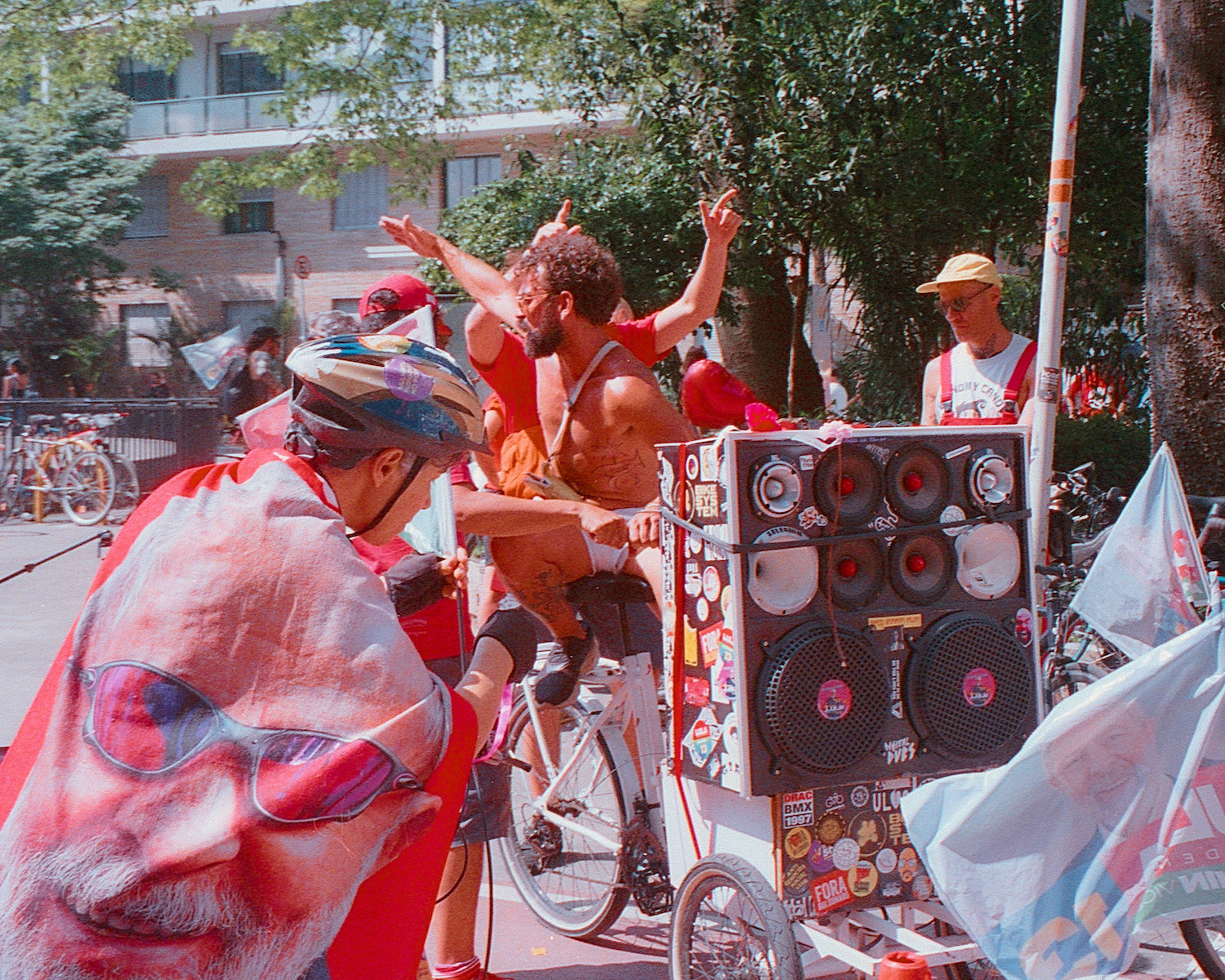
Isabella Pileggi, rally attendee
“The Brazil I want is, above all, a more equal country — one that gives opportunities to people of colour, to the poor and to marginalised communities. A Brazil that spares no effort to educate, not incarcerate — which today seems to be the state’s main objective. Above all, a more loving, gentle and patient Brazil, which I believe we are in essence but we have forgotten how to be in recent years.
For someone who has not yet decided his vote I would say that I understand the will to annul your vote. However, in practice, a null vote doesn’t help at all — we will either have Lula or Bolsonaro as president in 2023. It’s not a choice I want to make, but nothing we do will change that. Still, with everything that has happened in the last four years, the two really can’t be compared.
Under Bolsonaro, we’ve seen the vast destruction of public policies, a neglect of the vulnerable and poor population and, finally, immense neglect of the entire population in relation to COVID. Above all, I am ashamed that my country is governed by a man who decides to chant vulgar things on the anniversary of the country’s independence [during public Brazilian Independence Day celebrations, Bolsonaro directed the crowd to chant that he was ‘imbrochável’, an adjective describing a man’s sexual potency].”
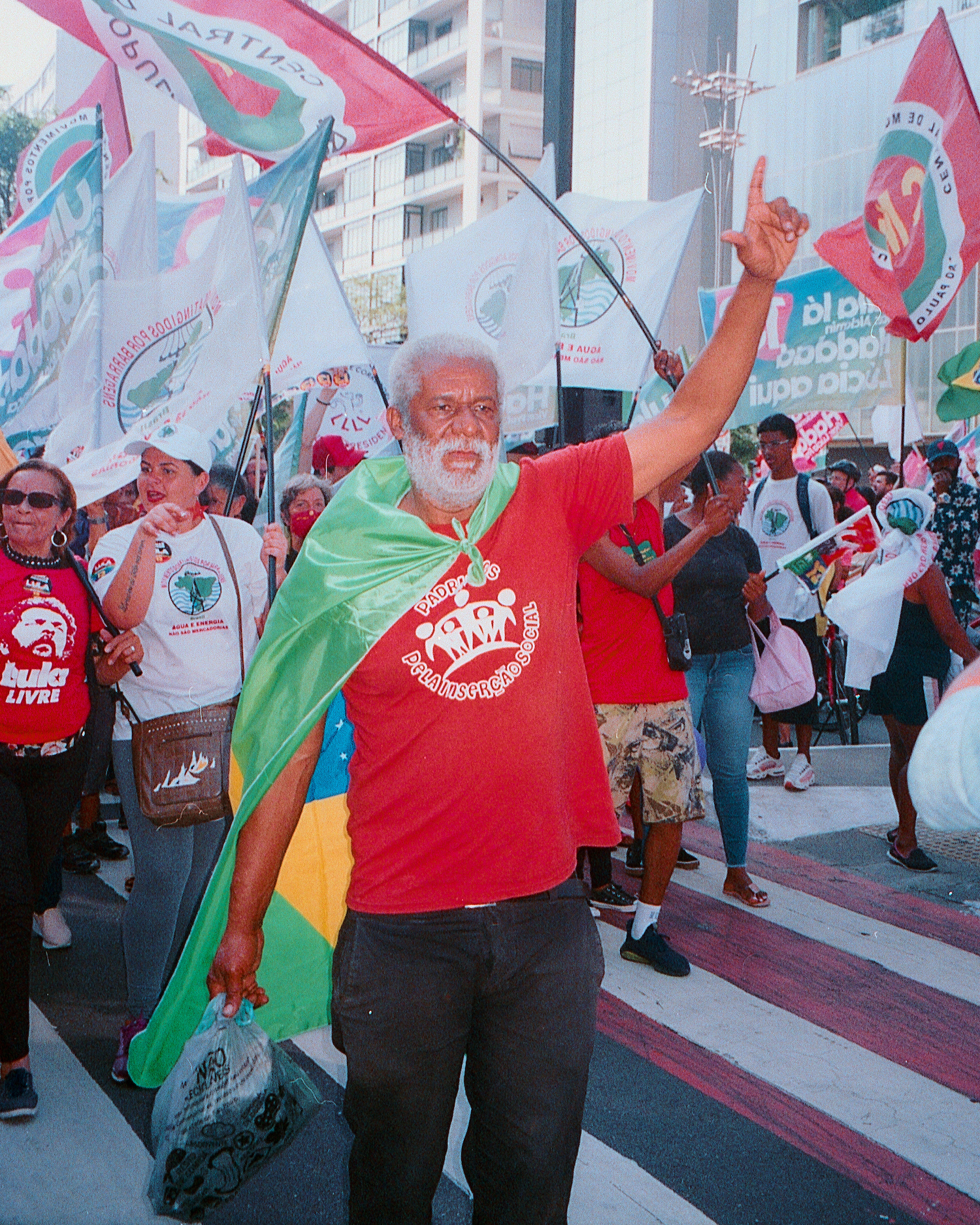
Amanda Sadalla, a women’s rights activist for women’s issues and the co-creator of Serenas, a nonprofit that advocates for young women who have been victims of violence and for reproductive rights.
“As an activist for the rights of girls and women, yearning for a country that actively fights for the prevention and confrontation of violence against girls and women, especially Black women, I understand that these elections are highlighting that public policies today in Brazil do not work. We are going backwards in gender equality policies, on anti-racism policies, on reproductive rights. Due to the elections, the population is discovering how our public budget today does not provide funds for all these issues.
What worries me the most is how absent they are in the speeches of candidates. It should appear with a much stronger emphasis. The budget for women’s issues, which has decreased a lot in recent years, has not been discussed. And there has been no mention of how we will face the Brazilian reality where more than 60% of rapes are against girls under 13 years old. It worries me that there are no candidates who are committed to gender equity within the ministries. And I am concerned to see hate speech against minority groups, against women, against Indigenous people and Black people being reinforced in these elections.
I want to live in a Brazil where no child or young person is afraid of being who they are. A Brazil where a Black boy is not afraid to go out on the street, and where a girl is not afraid of receiving sexualised comments. I want to live in a country where girls don’t stop going to school because they don’t have sanitary pads. I want to live in a country where a gay boy is not afraid to assume his identity for fear of being raped at school.
The world should also worry about this election, because in the last four years Brazil has lived through an absurd process regarding the destruction of social rights. Brazil was once a reference in public policies on sexual and reproductive rights — today we are a shocking example of how far it’s possible to descend.
To anyone who has not yet decided on their vote, ask yourself: what vote is needed to achieve a country where no child feels threatened, where no child is afraid to leave home because of their ethnicity, their gender identity, or their sexual orientation? This is a vote in a government that thinks about humane public policies, that recognises the needs of each and every one.”
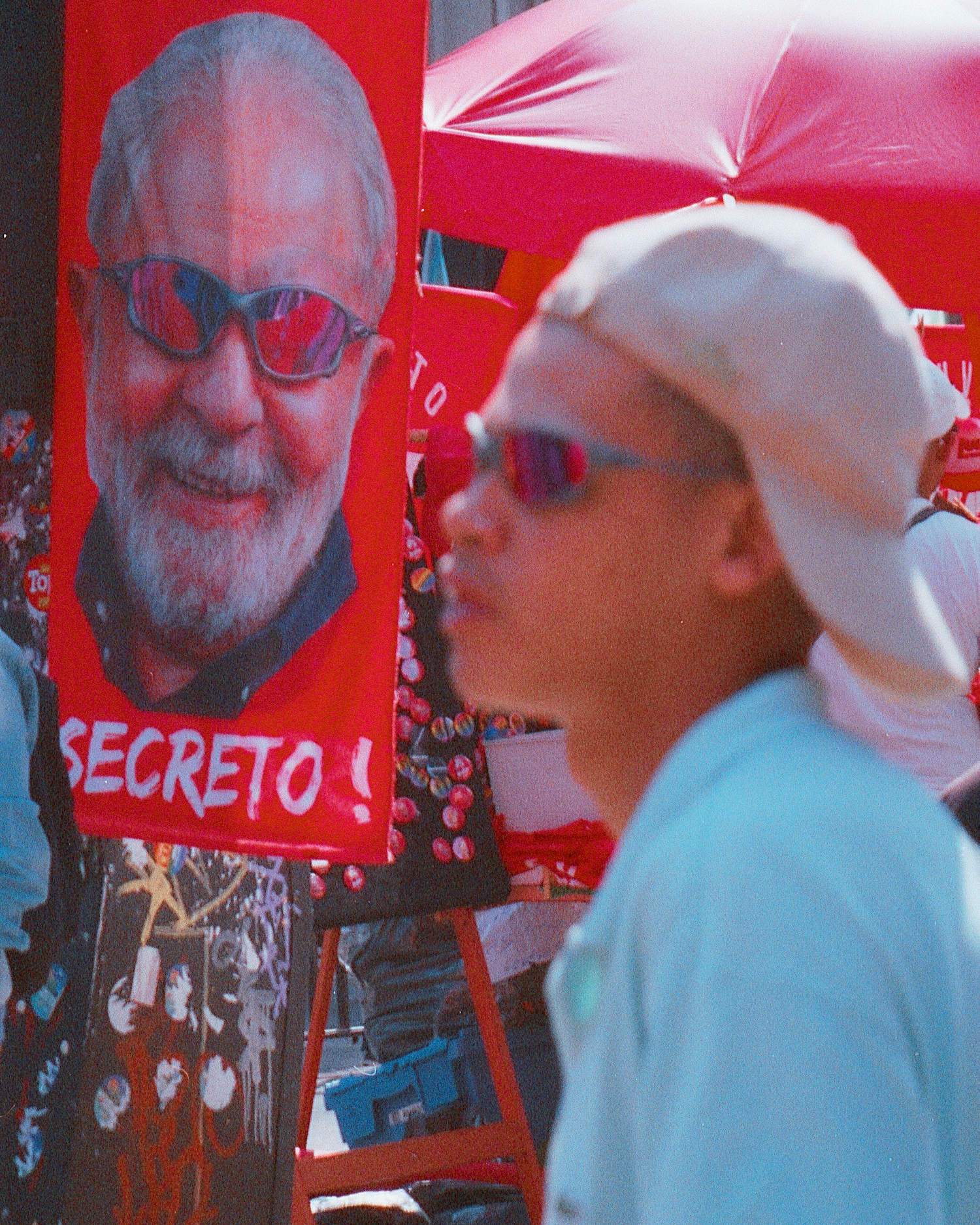
Maya, rally attendee
“The issue of increasing social inequality is what worries me the most in this election. We urgently need progressive social reforms. In this election, from a global point of view, I feel that the environmental cause is the main issue. Many people look down at the Northeastern population for always voting mostly for Lula but, for example, being a Northeasterner, I know that the destruction that is happening up there made São Paulo go dark at 3 pm, turning the day into night. There is no point in separating regions in this matter — the whole world is being affected. This government is going to great efforts to distract from the environmental issue, so that billionaires can continue to profit from the destruction of our country. For someone who still hasn’t decided on their vote, I would say that it can still get a lot worse. If you don’t want to vote for any personal issues: well, dear, vote for gossip. [Bolsonaro has installed 100-year secrecy decrees on personal and government documents. If Lula is successful, he has promised to lift them and publicly reveal these documents contents.]”

Hannah Marucci, co-founder of A Tenda, a social project that capacitates women — especially indigenous, Black and LGBTQIA+ women — who want to run for congress.
“Currently, in Brazil, we live in an incomplete democracy, since it is not representative of society. While the Brazilian population is majoritively Black and female, what we see in the spaces of power is just the opposite: an over-representation of white, rich and avowedly heterosexual men. It is not possible for these people to represent the population as a whole, which results in flawed public policies, misuse of public resources and social injustices. I got involved in the electoral process because I believe it can be a source of transformation if we manage to put Black, LGBTQIA+ and Indigenous women in power and decision-making spaces — groups that make up a social majority but a political minority. I want to live in a Brazil where all people have the material, emotional and social conditions to be what they want, without fear, hunger, oppression and shame.
This election is also of global importance. We are experiencing a worldwide movement of authoritarian inclinations, of which Brazil is a part. The largest democracy in Latin America choosing to live under authoritarian rule impacts all other democracies, putting them at risk. Furthermore, environmental deforestation has seen exponential over the last four years, and will only intensify in the event of Bolsonaro’s reelection. The Amazon, the largest tropical forest in the world, is under extreme risk.”
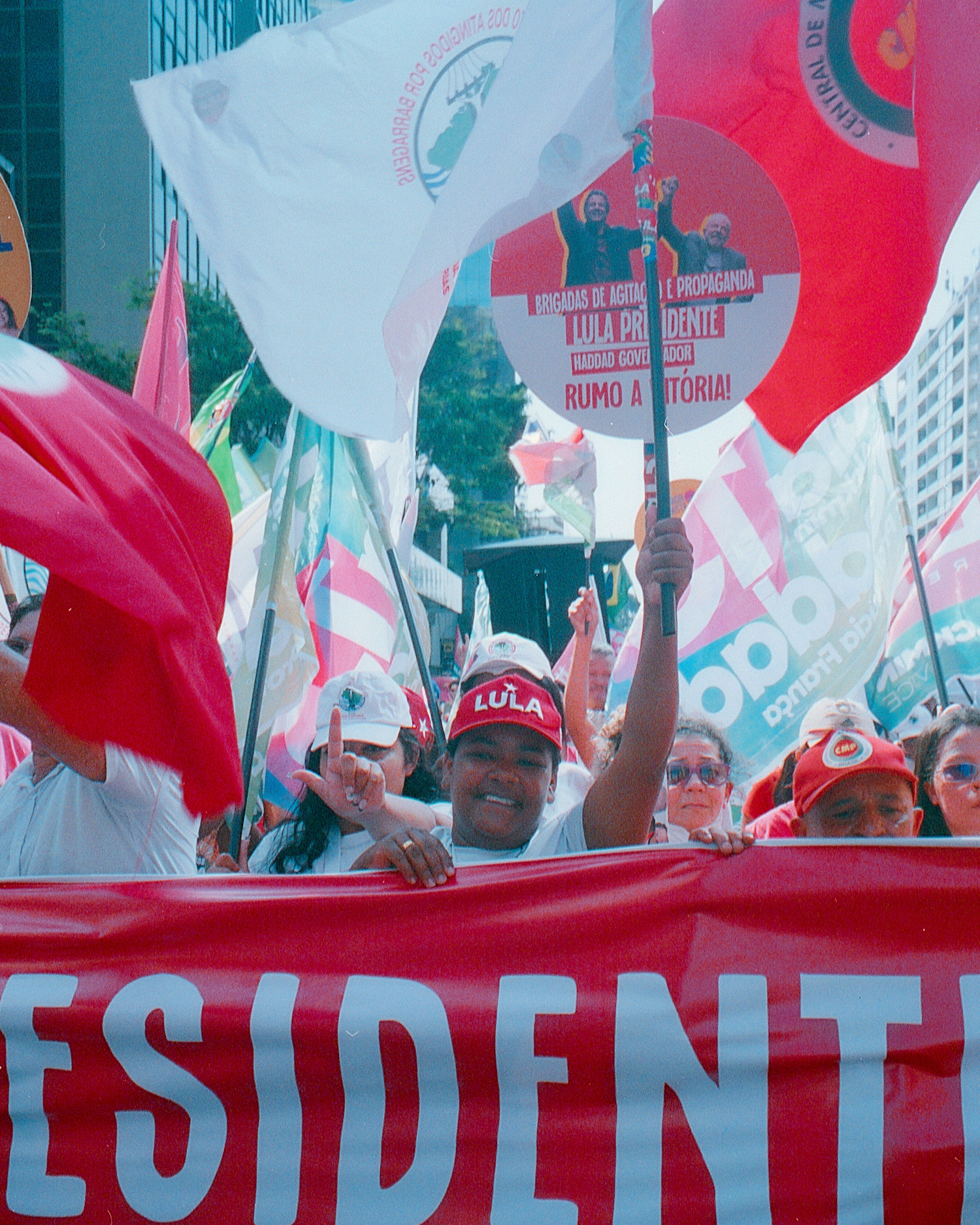
Jéssica Soares, rally attendee
“With this election, there is a risk that a political logic that basically reinforces everything I fight against as a person and a professional — violence, prejudice, lack of class consciousness, ignorance, denial of science, environmental destruction — will be installed once and for all.
I work in a closed maximum-security prison. The inmates there do not vote, because they lose their political rights by law when they are convicted. This population — incarcerated people and their families — are among those who suffer the most from exclusionary politics — and everything about this government is a setback when it comes to human rights.
Under Bolsonaro, being a woman, being Black and/or being LGBTQIA+ is very scary again. In addition, the cuts made in the areas of education, health and universities shake everything I idealise in a civilised society. Mental health, for example, has returned to the institutional logic of hospitalisation and isolation of patients, against what was built with the Psychiatric Reform so many years ago.
I want to live in a country that has real diversity in its seats of power. A country that cares about the less privileged classes to the point of thinking about public policies aimed at them as a priority. A country that encourages small farmers and values Indigenous people. That implements land reform efficiently. A country that invests in sustainable energy, that also encourages more environmentally sustainable practices in the population. A country that looks at violence as a social problem and not just an ostensible policing problem. That people, even if they are born in less favoured situations, have real opportunities to aim for prestigious places, with decent health and housing.”



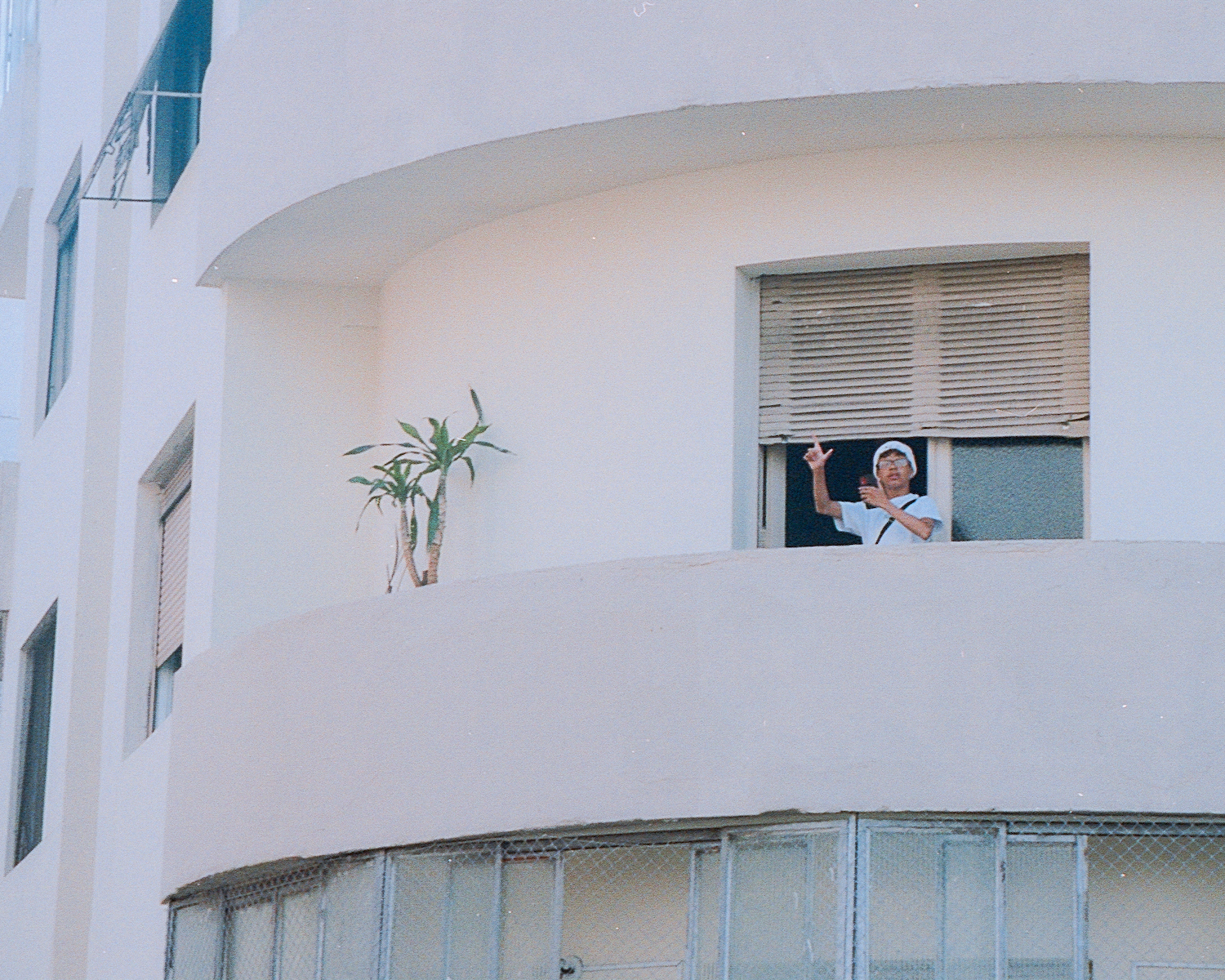
Credits
Photography Pedro Pinho
